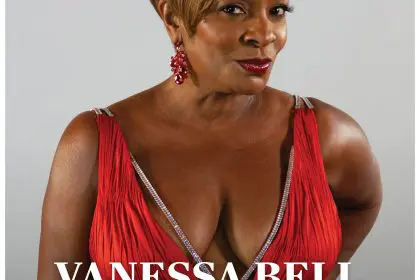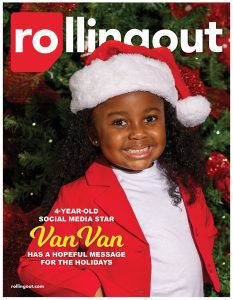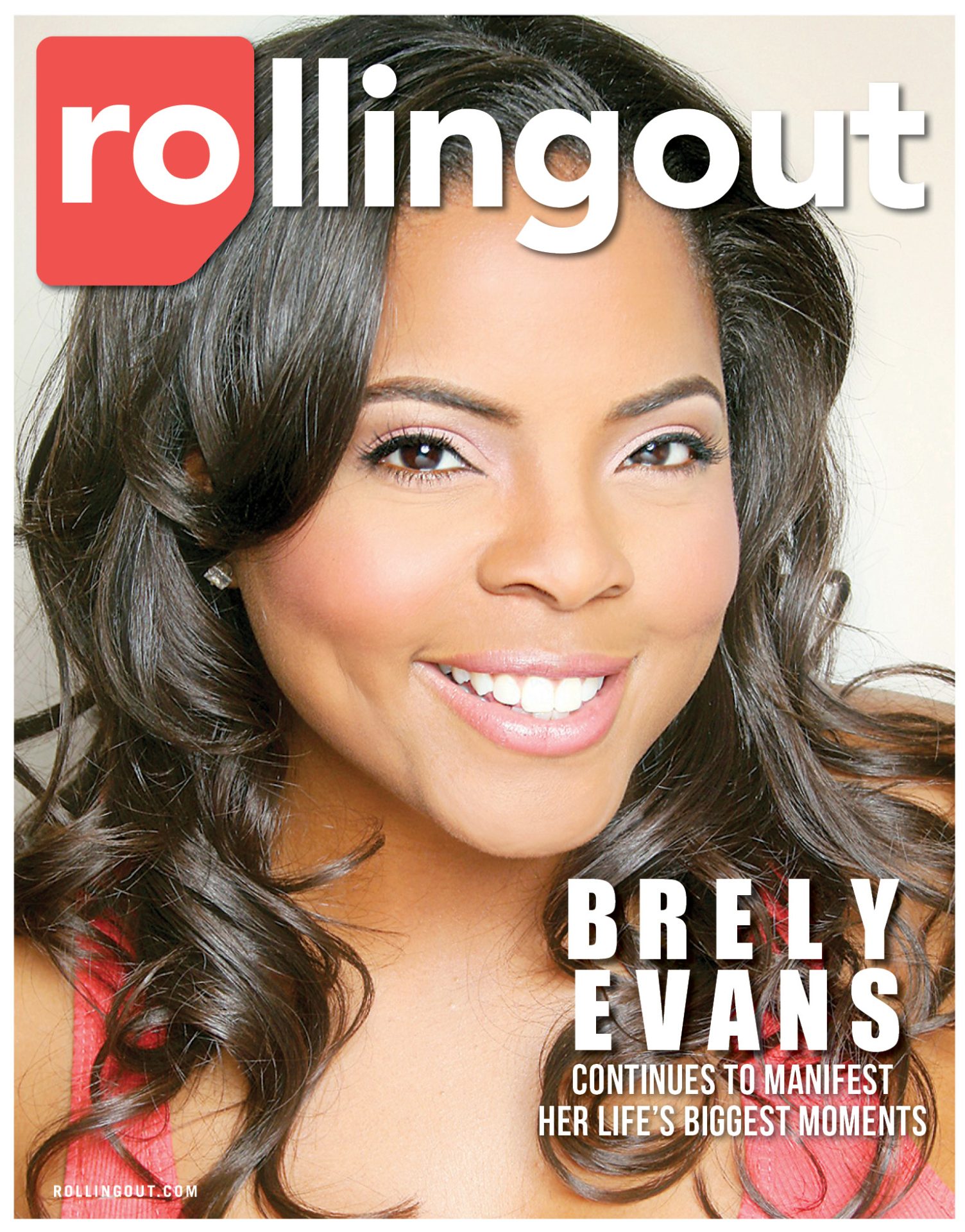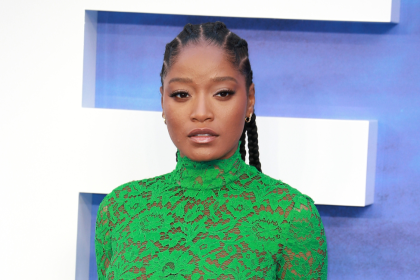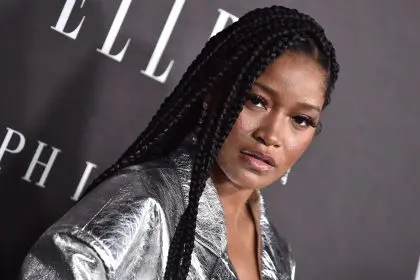 Story by A.r. Shaw
Story by A.r. Shaw
photos by keith major for steed media service
The streets of New York are always filled with thousands of individuals rushing to get anywhere fast. In the week before Christmas, the pace increased tenfold as visitors and residents added to the mad holiday rush. New York minutes can feel like nano seconds. There just never seems to be enough time.
On the 18th floor of the Loews Hotel in Manhattan, that same frenetic energy made its way to the set of rolling out’s exclusive cover shoot with the incomparable Queen Latifah.
As photographer Keith Major set up a makeshift studio, the wardrobe and makeup team hurried in anticipation of the Queen’s arrival. But once Queen Latifah arrived on set, a certain calm engulfed the atmosphere. Highlighted by her dazzling brown eyes and beautiful cheekbones, her warm smile and serene voice put our entire production crew at ease. Thanks to Queen Latifah’s self-assurance and complete composure, what could’ve been a hectic photo shoot and interview eased into the peacefulness of a walk in the park.
Time is never an obstacle when you are as determined as Queen Latifah. The consummate professional, every moment with Queen Latifah can feel like a tutorial in success.
She juggles multiple occupations with such precision that it seems second nature. In a career that spans over 20 years, she’s been involved in 38 movies, serves as a spokesmodel for CoverGirl, has her own Queen Collection clothing line, produces the groundbreaking hit TV drama “Single Ladies” for VH-1, and she’s currently developing a new talk show to be produced by Will Smith and Jada Pinkett Smith.
 Queen Latifah recently celebrated the release of her new film, Joyful Noise. Starring alongside Dolly Parton and Keke Palmer, Queen Latifah turns in a gut-wrenching performance in a movie that will keep audiences of all ages laughing, crying and celebrating music that moves the spirit.
Queen Latifah recently celebrated the release of her new film, Joyful Noise. Starring alongside Dolly Parton and Keke Palmer, Queen Latifah turns in a gut-wrenching performance in a movie that will keep audiences of all ages laughing, crying and celebrating music that moves the spirit.
It’s an inspirational tale that exemplifies Queen Latifah’s remarkable strength, beauty and ability to achieve the impossible.
For the Queen, it’s just another ordinary day.
Joyful Noise is a film that focuses on the lives of working -class Americans who are drawn together by their love for music. Why is this story important in this day and time?
I think it’s always something that’s very necessary. The people in the film are dealing with the recession, personal issues and family issues. So to have God to lean upon is very important. Even if you are not a Christian, people can relate to the spiritual, uplifting, and inspirational aspects of the movie. When they walk out of the theater, it gives them a little hope for the future. You don’t get that in many films these days. It speaks to all ages and especially young people who are very spiritual and need movies like that to uplift them as well.
This film deals with music and reveals how it changes lives and unites people. Thinking back, how did music change your life?
It started with me writing down my thoughts and my feelings. That was important for me because my writings turned into poetry, which then turned into raps. But it started with me just writing my thoughts down. It really helped to release those feelings. It kinda kept me on a positive path and away from getting in trouble and acting out.
When you began writing, did you ever think that you could leave a tremendous mark in so many areas of entertainment?
A kid can dream [laughs]. But did I think it was going to happen like this? Not at all. I didn’t expect for my life to take this path. I’m just on the journey taking this road that God put me on.
The music industry has changed tremendously since you released your first album. What is most striking about today’s music industry?
Ironically, the industry has kind of turned back to an independent mentality like it used to be when I initially began. So people without money or a record label can still make it. I think it all comes down to your art and your gift and continuously working on that and just building it. You have to continuously work on your craft and try new things. Artists today just have to have the courage to do the things that they know they are capable of doing. It also has a lot to do with luck. There are a lot of talented people who haven’t been able to break through. But once you get that crack in the door, you just have to kick that thing through and keep pushing and have a serious work ethic. You have to make it happen.
In the film, your character deals with being a single mother while attempting to keep her family together. How can single parents work cooperatively so that they won’t lose touch with their kids?
Communication is key between single parents. My mother and father planted so many seeds in me that it stuck with me. You really have to talk and listen to your children so you will be able to work through various situations. Parents really need to respect their children and vice versa. Personally, I started to really trust and open up to my mother during my late teens. But that happened because of that respect level that was present.
There are moments when mother-daughter conflicts are explored. What can young mothers take away from those scenes?
One of the greatest things about Keke Palmer’s character is that there was so much planted in her at a certain age. She still knew who God was and the difference between right and wrong. She kept her rebellion, but deep inside the seed was already planted. Although I’m not a mom yet, I have been that 17-year-old girl that had to be checked. When a mom says, “I brought you into this world and I’ll take you out,” I truly understand what that means. To push a child out of your body and bring them here … there is a great deal of love and pain that’s involved. And to think about how much love you put into a child, it can be difficult to see them get smart with you and go away from the path you’re trying to make for them — especially when you’re just a mother trying  to handle things and you’re missing your man. And no one knows how cold your sheets are at night because you’re trying to carry the torch. I imagine what my character had to go through and that was a moment that pushed her over the edge.
to handle things and you’re missing your man. And no one knows how cold your sheets are at night because you’re trying to carry the torch. I imagine what my character had to go through and that was a moment that pushed her over the edge.
There’s a theory that Sunday is the most segregated day in America. How much do you think race relations have changed in the church?
I think that has changed a lot. The church I go to in L.A. is very multicultural. A lot of those racial barriers are breaking down. Oftentimes, the pulpit was a place to preach not only positivity and gospel, but also a message of segregation and hatred. I think as time has evolved, those barriers have broken down quite a bit and we all praise the same God at the end of the day. As we connect more with each other in this country, those lines of division will break down. And we reflect that in the film.
How does faith keep you grounded as a celebrity in the hectic world of Hollywood?
I do a lot of things that make me have to lean on Jesus. I’m definitely not perfect, but having that faith has allowed me to not become of Hollywood, of hip-hop or of the ‘hood. I step into those worlds and God quickly reminds me of what the truth really is.

